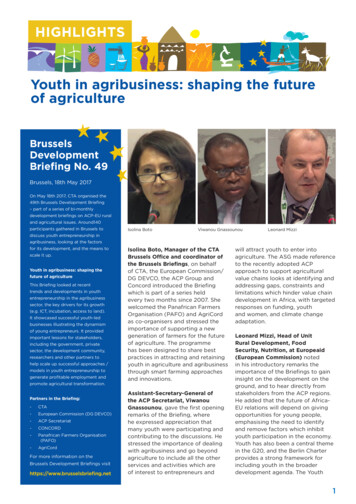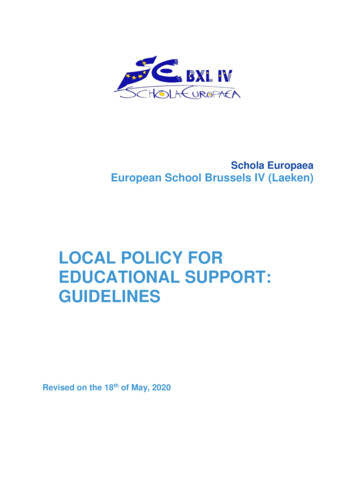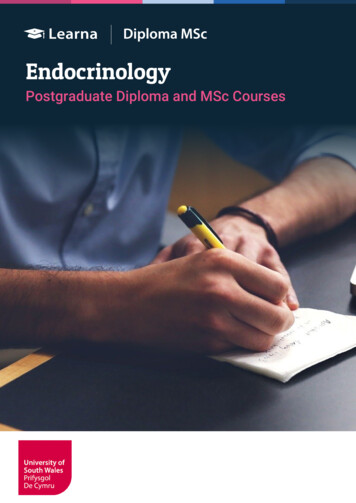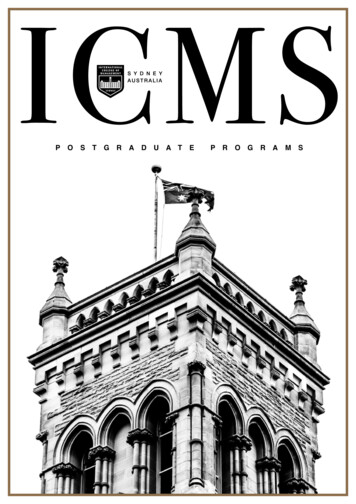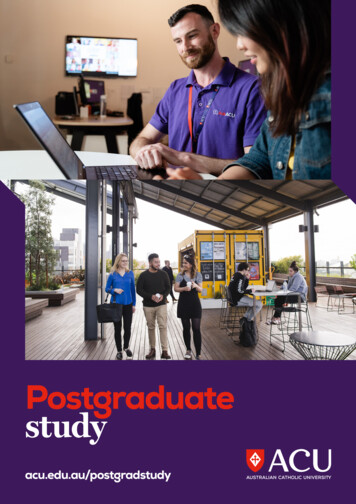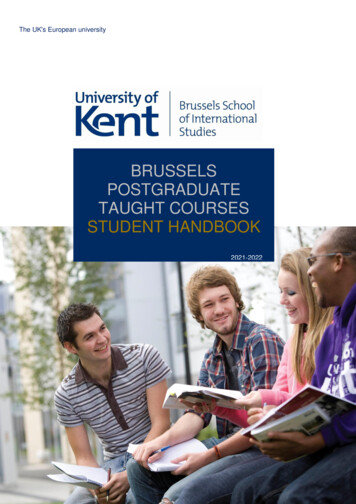
Transcription
The UK's European universityBRUSSELSPOSTGRADUATETAUGHTPROGRAMMES /European universityBRUSSELSPOSTGRADUATETAUGHT COURSESSTUDENT MES
DEAN FOR EUROPE’SWELCOMEDear MA and LLM students,Welcome to BSIS!By coming to Brussels, and the Brussels School of International Studies, you have made anexcellent choice toward your international career. Although this year we are delighted toreturn to face-to-face teaching as much as is possible, using online when necessary for staffand students and to enhance the learning experience. We will continue to make our studyingsafe with our Covid-19 health and safety measures - we are confident that we have put inmeasures to ensure the high quality of learning and teaching. Your safety is our highestimportance and you will need to read carefully the BSIS Code of Conduct for Covid-19.We are all here to support you in your studies and make your learning a positive andtransformative experience.Whether you are coming to us directly from your previous studies, or you have worked forsome years and are returning for post-graduate study, you will be able to build on what youhave learned and experienced before coming here.BSIS is a wonderful place for many reasons. We have staff and students from around theworld and we celebrate that diversity as key to our learning. That diversity supports,accompanies and enhances what we do at BSIS. We are committed to building a fullyinclusive and respectful community. Respect of each other is the core of education and itrequires awareness of ourselves and others.While at BSIS, focusing on one or two areas of study, you will gain substantive knowledge,but you will also question and think more broadly, which both moves you forward in youracademic skills, but also in skills you can apply in employment after you graduate.Teaching and learning in the British system – we are a British university, despite our locationin Belgium – is an independent process, but it is one supported through academic guidance,on-line work and sharing with each other in seminars and elsewhere.Take full advantage of everything that BSIS and Brussels have to offer this year! In additionto your classes and seminars, come to our Guest Lecture Series events and other events, goto conferences and workshops across Brussels.Welcome to BSIS. Be enriched by ideas and keep safe together.Professor Jeremy CarretteDean for Europe, University of Kentv.2/09/2021Page 1
CONTENTSWho is who? . 3Calendar and Term Dates . 7MA and LLM Courses . 8Changes in the mode of study . 12Coursework and Dissertation Submission . 14Extensions, complaints and appeals . 17Academic Information . 20Accessing Online Services . 23Digital Library Resources . 24End of Studies . 25Student Life and initiatives . 26Student Support . 29Living in Belgium . 33BSIS Facilities. 34v.2/09/2021Page 2
WHO IS WHO?Dean for Europe, Director of the University of Kent’s Brussels School ofInternational Studies (BSIS)Professor Jeremy CarretteResponsible for the overall leadership and managementof BSISAcademic StaffProfessor Yutaka AraiProfessor of International Human Rights LawDr Albena AzmanovaReader in Political and Social TheoryDr Tom CasierReader in International RelationsDr Yvan GuichaouaSenior Lecturer in International Conflict AnalysisDr Amanda Klekowski vonKoppenfelsReader in Migration and Politics (research leave 2021-22)Dr Bojan SavićLecturer in International RelationsProfessor Harm SchepelProfessor of Economic LawVisiting LecturersDr Elena AtanassovaCornelisPower, Interests and Identity in the Asia-PacificDr Olga BurlyukForeign Policy Analysis, EU Politics and GovernanceDr Rebecca CassidyGlobal Health Policy in a Globalised WorldDr Chris DownesInternational Trade LawDr Marin FerryDevelopment EconomicsDr Daniel FiottEuropean Foreign and Security Policy in the 21st CenturyDr Matthew GoldmanAdvocacy and CampaigningDr Emmanuel-Pierre GuittetCritical Approaches to SecurityDr Joost HiltermannPolitics in the Middle EastSian Lewis-AnthonyCritical International Immigration Lawv.2/09/2021Page 3
Reda MahajarTheories of Migration, Integration and CitizenshipDr Tarila Marclint EbiedeAfrican PoliticsDr Björn NilssonDevelopment EconomicsDr Laura PuccioEuropean Union International Relations LawSonya Reines-DjivanidesNegotiation and MediationDr Josipa ŠarićLegal Aspects of Contemporary International ProblemsDr Jonah Schulhofer-WohlTheories of Conflict and ViolenceConflict and SecurityDr Pietro SulloPublic International LawDr Anthony ValckeEuropean Union Migration LawDr Lucy WilliamsDr Claire ZanusoHuman Security in Forced MigrationMigration: Conflict, the State and Human RightsDevelopment EconomicsProfessional Services StaffHead of Operations (Europe)Alastair RossAgata Archetti-MaestriLauren Krstićeurofin@kent.ac.ukbsis@kent.ac.ukSarah Konatév.2/09/2021Responsible for the operations at BSIS and managementof the professional services teamRecruitment and Admissions OfficerApplications and enquiries, marketing, advertisingOffice Administrator (Facilities)General enquiries, timetable, buildingFinance ManagerTuition fees, scholarships, invoicingOffice Administrator (Research and Events)General enquiries, research support, eventsPostgraduate Co-ordinatorModules, courses, assessmentPage 4
Academic Administrative RolesDirector of Graduate StudiesDr Bojan SavićResponsible for all Masters coursesCourse Convenors: LawProfessor Harm SchepelDirector of Law, responsible for all Law courses incollaboration with the Director of Graduate StudiesCourse convenor for LLM International LawProfessor Yutaka AraiLLM Human Rights LawCourse Convenors: Politics and International RelationsDr Tom CasierDr Yvan GuichaouaDr Lucy WilliamsDr Albena AzmanovaDr Bojan SavićMA EU External RelationsMA International Conflict and SecurityMA International DevelopmentMA International MigrationMA International Political EconomyMA Political Strategy and CommunicationMA International RelationsResearchDirector of Graduate Studies (PhD Courses)Dr Yvan GuichaouaResponsible for all Postgraduate Research coursesDirector of Research and EthicsDr Albena AzmanovaResponsible for research events and activities, includingthe Guest Lecture Series, and research ethicsDirector of Global Europe CentreDr Tom Casierv.2/09/2021Responsible for the management of the School of Politicsand International Relations’ Global Research CentrePage 5
BSIS Journal EditorDr Albena AzmanovaEditor of the BSIS JournalHow to use this HandbookThis Handbook includes Brussels-specific information, so this should be your first point ofreference. As we are an integral part of the University of Kent, our procedures follow theUniversity of Kent regulations. As such, this handbook should be read in conjunction with theUniversity of Kent’s Postgraduate Taught Masters Student books.html and the University of Kent’s StudentCharter and Regulations for Students mmunicationAll communication with you will be via your Kent email address. It is your responsibility tocheck this regularly to make sure you receive information related to your course.All BSIS staff and students are members of the BSIS email List (bsis-21) which is designedas a means of cross centre communication.Please also follow us on Facebook, Twitter, LinkedIn and Instagram.Email EtiquetteThe way in which you communicate and present yourself is important. How you choose tointeract conveys your level of seriousness and professionalism.Please adhere to the following when emailing at Kent:1) Always use your @kent.ac.uk email address2) Choose a subject that is directly relevant to the topic you are addressing3) Begin your email by using professional salutation, and end your email with a closingand your signature4) Be clear and concise5) Use correct spelling and proper grammar6) Think twice before clicking 'reply all’7) To follow up on an email, do not just click ‘forward’; always include a covering notev.2/09/2021Page 6
CALENDAR AND TERM DATESAcademic Year 2021 – 2022The academic year is split into terms. The length and pattern of the terms depend on thetype of course the student is following. The period between each of the terms is a vacationperiod. The University will be closed over the Christmas period.The year is divided into two 12-week terms and one 6-week term. A postgraduate studentstudying an MA or LLM at Kent will be taught for a total of 24 weeks per year. These areweeks 1 to 12 in the September (or Autumn) term and 12 to 24 in the January (or Spring)term. The 6-week summer term is the dissertation supervision period.September Term: 28 September 2020 to 19 December 2021 8 October 2021 – Board of Examiners - Final Board for students graduating inNovember 2021 1 November 2021 – All Saints Day (Public Holiday) 11 November 2021 – Armistice Day (Public Holiday) 25 December 2021 – Christmas Day (Public Holiday) Winter Vacation takes place from 18 December 2021 until 16 January 2022 University Closure 22nd December 2021 until 3rd January 2022January Term: 17 January 2022 to 8 April 2022 24 - 28 January 2022 – Exam Week End of February/beginning of March – Board of Examiners – Progression (todissertation) Board 18 April 2022 – Easter Monday (Public Holiday) 1 May 2022 – Labour Day (Public Holiday) 26 May 2022 – Ascension Day (Public Holiday) Spring Vacation takes place from 9 April 2022 until 8 May 2022Summer Term: 9 May 2022 to 17 June 2022 16 - 20 May 2022 – Exam Week 6 June 2022 – Pentecost Monday (Public Holiday) End of June 2022 – Board of Examiners - Progression Board for September 2021students and Final Board for January 2021 students 21 July 2022 – Belgian National Day (Public Holiday) 15 August 2021 – Assumption of Mary (Public Holiday)v.2/09/2021Page 7
MA AND LLM COURSESThe full list of courses and specialisations at BSIS can be found on the streamsdocument.Course StructureAll MA and LLM courses are offered in both a Standard version (two taught terms, 90 ECTScredits), and an Extended version (three taught terms, 120 ECTS credits), and in each caseyou may take the course with or without a secondary specialisation. Each course is dividedinto two Stages. Stage 1 consists of six (or nine if taking the Extended version) taughtmodules whilst Stage 2 consists of a Dissertation. Each module is worth 10 ECTS; theDissertation is worth 30 ECTS.SpecialisationsYou may take a course with or without a secondary specialisation. A full explanation can befound on our website. You must take 3 modules in your primary specialisation and 2 in yoursecondary (in a Standard course) or 4 modules in your primary specialisation and 3 in yoursecond (in an Extended course). Example:Standard (90ECTS)MA or LLM PrimarySpecialisation onlyExample:MA in International Relations;LLM International LawMA or LLM with SecondarySpecialisationExample:MA in International Relations withInternational Conflict and SecurityorLLM in International Human RightsLaw with International MigrationExtended (120 ECTS)3 modules from primaryspecialisation, includingcompulsory4 modules from primaryspecialisations, includingcompulsory3 further modules fromcatalogue5 further modules fromcatalogueFDR module anddissertationFDR module and dissertation3 modules from primaryspecialisation, includingcompulsory4 modules from primaryspecialisation, includingcompulsory2 modules from secondaryspecialisation, including atleast one compulsory3 modules from secondaryspecialisation, including atleast one compulsory1 further module fromcatalogue2 further modules fromcatalogueFDR module anddissertation focusing on firstspecialisationFDR module and dissertationfocusing on first specialisationAdditionally:v.2/09/2021Page 8
-MA students on Standard courses may not take more than three law modules and thoseon Extended courses may not take more than four law modules-LLM students on Standard courses must take a minimum of four law modules and thoseon Extended courses must take a minimum of five law modules-Students may not be registered on more than 3 modules per term (full time) or 1 or 2modules (part time), in addition to FDRBalance of modules:Full time students must take 3 modules per term, plus FDR in your first and last taughtterms.Part time students must take one or two modules per term, plus FDR in your first and lasttaught terms.You may audit additional modules subject to spaces available. You should speak with themodule convenor if you are interested in auditing an additional module.Module selectionNew studentsIf you are a new student, you will need to choose your modules for your entire course ofstudy using the Module Choice Form. You will still have the chance to change thesemodules at the start of each term if you so choose.The latest dates for completing this module selection form are: 12:00 on Friday 24 September 2021 for students entering in September 2021 12:00 on Friday 14 January 2022 for students entering in January 2022Please read the instructions carefully and choose the required number of modules beforeconfirming. You must select modules for the full period of your study. Make sure youhave consulted your course convenor if you have any questions.Please remember that it is your responsibility to ensure that you are registered onthe correct modules for your course. Consult the streams document for the list ofmodulesAny changes to your course during “shopping” week must be submitted tobsispgadmin@kent.ac.uk, with module codes and titles, at the latest by the end of the firstweek of term.Returning studentsWhen returning for any subsequent term, you again have the opportunity to changemodules, whether you are changing one module or deciding on a secondary specialisation.Information about courses is here: https://www.kent.ac.uk/brussels/courses. Please sendyour module selection (code and title) by email to bsispgadmin@kent.ac.uk. The deadlinefor module choices is the end of the first week of term.Changing modulesShould an unexpected circumstance arise, there is a further possibility to change modules.From the start of the second week of term, if you wish to change a module you will need tofill out a Module Change form after discussing the change with both module convenors. Youshould take care that your module selection meets the requirements of your degree course.v.2/09/2021Page 9
TimetableThe term dates and timetable for each of the two teaching terms are available online.Seminar AllocationYou will be allocated to seminars automatically following module registration, including forFDR. If you wish to change seminar groups, please contact your module convenor andbsis@kent.ac.uk.In most modules, the first seminars will take place in the second week of term (Week 2 inthe Autumn and Week 14 in the Spring), although your module convenor will inform you ofany other pattern. As noted above, if you have not yet been allocated a seminar, e.g. for aMonday morning class, your convenor will arrange for an alternative and contactbsis@kent.ac.uk.Lecture and Seminar AttendancePlease note that you are expected to attend every lecture and seminar (asidefrom exceptional circumstances such as illness or family-related emergencies, in which caseyou should alert your lecturer) and to be punctual. While there is no formal sanction formissing either lecture or seminar, failure to attend lecture or seminar demonstrates a lack ofrespect for your lecturer as well as for your colleagues.Please note that if you are absent for a scheduled presentation or other inclass assessment, your absence will be taken as non-submission and marked at a zero.On the other hand, regular presence in class will enable you to learn the subject materialmore thoroughly and gain considerably more from the module. It will also help your lecturerget to know you better, and thus be better able to advise you on essay topics, writerecommendation letters, etc.Choosing Secondary SpecialisationAt the start of your last taught term, you will be asked to confirm your course title andspecialisation by completing an Application for Secondary Specialisation. Again, pleasenote that it is your responsibility to have determined that you fulfil the requirements for yourchosen secondary specialisation. You should consult with your course convenor about yourchoice.Part-time StudyAll of our standard one-year courses are available as a part-time option. If you wish to studypart-time, you will take three modules in the first academic year and an additional threemodules in the second academic year as well as complete a dissertation. You shouldtherefore expect to take one module minimum or two modules per term maximum. Parttime study is only available to EU/EEA passport holders or those with a right to remain inBelgium for the duration of their degree. You will take FDR Part I in your first taught term,and FDR Part II in your last taught term.Split-SiteThe split-site variant of a course enables students to complete their course across twouniversity sites: Canterbury and Brussels. Students on the Standard course wishing to spendtheir second term in Canterbury or on the Extended course wishing to spend either one ortwo terms in Canterbury should email bsispgadmin@kent.ac.uk for further information.v.2/09/2021Page 10
Two Capitals ExchangeThe University of Kent's Two Capitals exchange gives you a unique opportunity to studyinternational affairs in a global context. You will spend one year at the Brussels School ofInternational Studies before moving to another global capital to broaden your understandingof international studies.If you are interested in the Two Capitals exchange and require more information, pleaseemail bsisadmissions@kent.ac.uk.v.2/09/2021Page 11
CHANGES IN THE MODE OFSTUDYChange of CourseIf you wish to change your course of study upon arrival at BSIS or after your first orsecond term of study, you should in the first instance discuss this with the PostgraduateCo-ordinator bsispgadmin@kent.ac.uk to ensure that you have taken or are taking thecorrect modules to be able to effect such a change.As a matter of courtesy, it is also generally expected that you meet with the convenor ofyour original course to let him/her know you wish to change.You should also discuss this with the convenor of the course to which you wish tochange. Finally, you should make your request in writing by submitting a Change ofCourse form.You will normally be informed of the outcome of the request within five working days.Change of AttendanceFull time to Part time or Part time to Full timeIf you wish to change your mode of attendance from full-time to part-time, or vice versa, youshould in the first instance discuss this with the Postgraduate Co-ordinatorbsispgadmin@kent.ac.uk who can discuss the full implications of such a change with you.You should then make your request in writing by submitting a Change in mode of studyform. You will normally be informed of the outcome of the request within five working days.Part-time study is only available to EU/EEA passport holders or those with a right to remainin Belgium for the duration of their degree.Standard to Extended or Extended to StandardIf you wish to change the length of your course of study from the Extended course to theStandard course, or vice versa, you should consult the Postgraduate Co-ordinatorbsispgadmin@kent.ac.uk and then submit a Change between Standard and Extendedcourses form. Your request will need to be approved by the School Director of GraduateStudies, your Course Convenor and the Finance Manager.The deadline for attendance change is the last day of your first taught term.IntermissionIf you wish to intermit (take time out) from your studies, you should discuss the ramificationsof such a decision with your course convenor as well as the Postgraduate Co-ordinator whowill refer the request to the Director of Graduate Studies. If your request is approved by theDirector of Graduate Studies at BSIS it will then need to be passed for consideration by therelevant Divisional Director of Graduate Studies for final approval. There is an IntermissionProcedures for Postgraduate Taught Students: Leave to Intermit Application Form to bev.2/09/2021Page 12
completed and emailed to bsispgadmin@kent.ac.uk. You should hear within two weekswhether your request has been successful.v.2/09/2021Page 13
COURSEWORK ANDDISSERTATION SUBMISSIONHere is important information aboutcoursework and dissertationsubmission. Please note that all deadlines are at 12:00 noon Brussels timeCoursework Submission DatesSeptember Term modules essays:11th January 2022January Term modules essays:10th May 2022Coursework SubmissionPlease note that these are the general submission dates. However, some modules mayhave more than one piece of coursework and therefore several deadlines, while others mayhave earlier deadlines. Please consult each module outline for further details.For all modules, one electronic copy is required to be submitted electronically on Moodle(http://moodle.kent.ac.uk) by the deadline and not directly by email to lecturers. Please notethat all coursework will be analysed using plagiarism software.To complete the submission, please go to the module concerned, click on Assignments andfollow the instructions detailed for each piece of work.Full instructions can be found by following the ssertation DatesStudents submitting dissertations in April 2022Draft Dissertation Proposals - All studentsWednesday 6 October 2021Dissertation Proposals - All studentsFriday 26 November 2021Dissertation submitted - All studentsFriday 8 April 2022Students submitting dissertations in August 2022Draft Dissertation Proposals - All studentsWednesday 26 January 2022Dissertation Proposals - All studentsFriday 18 March 2022Formal dissertation supervision ends - All students Friday 17 June 2022Dissertation submitted - Politics studentsFriday 5 August 2022Dissertation submitted - Law studentsFriday 19 August 2022Students submitting dissertations in April 2022: dates to be confirmedv.2/09/2021Page 14
Dissertation SubmissionCandidates should submit one electronic copy of their dissertation via Moodle. Tocomplete this process please go to the FDR (Fundamentals, Dissertation and Research)module and click on the Assignment and follow the instructions online. Further fPlease note that all dissertations will be analysed using plagiarism software. Thesestandards apply: e Submissions of Coursework or DissertationExtensions to submission deadlines are applied for and granted centrally. Extensionsmay NOT be granted by module or course convenors, or by seminar leaders. You mayapply for an extension in the case of ill health or other misfortune, by following theprocedure outlined in the Mitigation section of this Handbook.If a piece of coursework or a dissertation is submitted after the deadline you will receivea mark of zero.In the event of a non-submission and in the absence of mitigation evidence, the Board ofExaminers will normally request that the coursework be resubmitted but with the mark forthe module capped at a Pass (50).Marks, Marking and FeedbackGenerally, marks and feedback will be made available on Moodle three weeks after thecoursework submission deadline. Click on your assignment and you will be able to seethe feedback comments by clicking on the speech bubble at the bottom right of the page.Please note that some feedback particularly that noted on the essay document itself maynot be visible on all mobile devices such as smart phones or tablets but only on laptopsor desktop rks.pdfGenerally within 2 to 4 weeks after the release of marks on Moodle, these marks willhave been transferred to Kent Vision. Marks, however, are only confirmed at the Stage 1Board of Examiners. Please see the information on the marking procedure and findadvice on what to do when reading academic feedback on your essay.ExaminationsSome modules offered at BSIS are assessed via a formal examination. If you havechosen one of those modules you will be invited by email to your exam session. Thereare two exam sessions per year. Which session you attend will depend on when yousubmit your dissertation.Revision sessions may be arranged by module convenors in the week preceding eachset of examinations.January 2022Students submitting their dissertation in April 2022 and exchange students only. POLI9320 International Relations TheoryAny resitsTuesday25 January 10:00-12:00Wednesday 26 January 10:00-12:00May 2022v.2/09/2021Page 15
Students submitting their dissertation in August 2022 and exchange students only. ECON8780 Development EconomicsTuesday POLI9350 Global Governance andInternational OrganisationsWednesday 18 May 10:00-12:00 POLI9320 International Relations TheoryThursdayv.2/09/202117 May10:00-12:0019 May 10:00-12:00Page 16
EXTENSIONS, MITIGATION,COMPLAINTS AND APPEALSDeadlines are a fact of academic and working life and an ability to meet them is an essentialskill. You are expected to submit your work on time. Coursework deadlines areREQUIREMENTS which have to be met, not aspirational targets.However, we recognise that there can be exceptional circumstances, such as illness or othermisfortune, which may have an impact on your ability to submit work on time or impair yourperformance. To address such situations, the University has established mitigationprocedures.Full details relating to mitigation and extensions can be found on the University web pages:Annex 9: Mitigation of Extenuating CircumstancesThere are two different types of mitigation for which you can apply, outlined below. The BSISMitigation Committee is responsible for considering all applications.Extension to coursework and dissertation assessment deadlinesIf you feel that you are not going to meet a coursework submission deadline due toexceptional circumstances, such as illness or other misfortune, you can submit anApplication for an extension to coursework deadline. This will be considered by the Directorof Graduate Studies or his nominee on behalf of the Mitigation Committee. This applies to allstudents, regardless of whether or not you have an Individual Learning Plan (ILP).Applications for extensions to coursework assessment deadlines must be made prior to thedeadline (no later than 24 hours in advance).If your request to extend a coursework deadline or a scheduled assessment is accepted, theappropriate actions include: Maximum 2-week extension depending on the severity of the impact of thecircumstances.Maximum three-month extension for postgraduate dissertationsIf you have an Inclusive Learning Plan (ILP), extensions specified in the plan will beautomatically granted. If additional exceptional circumstances arise, you should follow theprocedure as outlined here, and will be considered by the Director of Graduate Studies onbehalf of the Mitigation Committee.The following reasons are not grounds for mitigation. This is not an exhaustive list: IT problems such as malfunctioning computer, lost files or accidental deletion incorrect version of work uploaded having multiple deadlines close to, or at the same timev.2/09/2021Page 17
having an internship* having a job* having a role in a student-led initiative* While BSIS encourages its students to benefit from internship opportunities available, andsupports working students who are concurrently studying, the expectation is for this to bedone alongside studying and time to be managed accordingly so that coursework deadlinerequirements are met.MitigationsMitigation is a corrective measure that allows Boards of Examiners to make adjustments tomodule marks and award credit where a student performance in assessment has beenimpacted negatively by extenuating circumstances beyond the student’s control.Possible interventions Overriding late submission penalties; granting time-limited extension; offeringequivalent assessment where appropriate (eg, rescheduling missed in-course test)AND/ORDisregarding affected assessments or coursework requirement for the affectedmodule or modules where these individually or in combination contribute less than20% of the mark for the module(s) in questionDisregarding individual assessments for the affected module or modules, includingwhere these contribute to 20% or more to the overall mark for the module(s) inquestion, provided that (i) the learning outcomes for the module(s) are achieved; and(ii) such adjusted marks properly represent the student’s achievement on themodule(s) as a while AND/ORCondonement and deferralMore detailed information can be found in on the University web pages: Annex 9: Mitigationof Exte
Dr Albena Azmanova Reader in Political and Social Theory . Dr Josipa Šarić Legal Aspects of Contemporary International Problems Dr Jonah Schulhofer-Wohl . All MA and LLM courses are offered in both a Standard version (two taught terms, 90 ECTS credits), and an Extended version (three taught terms, 120 ECTS credits), and in each case .


